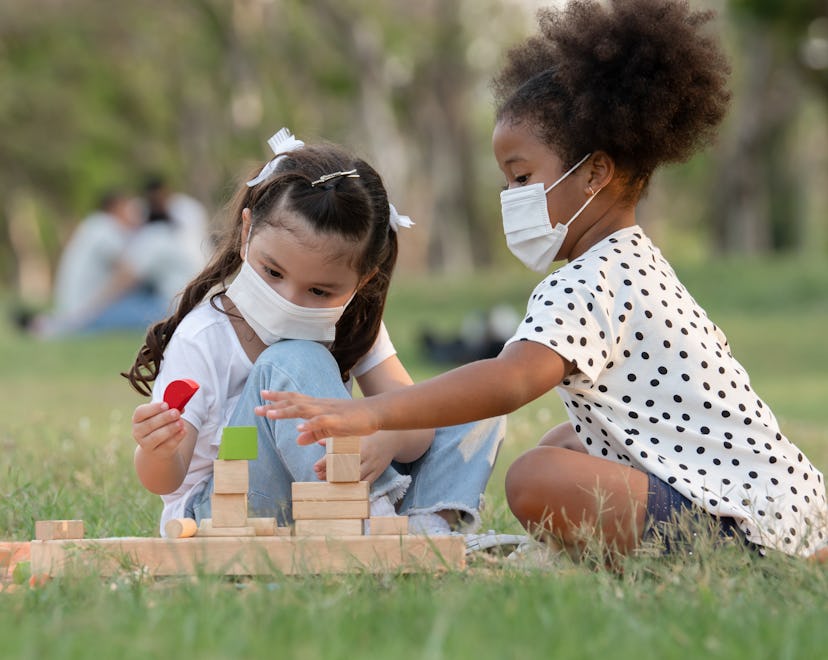Covid-19

Everything You Need To Know About The Covid Vaccine For Kids 5 To 11
It’s finally here, but how is it actually different from the original vaccine?
The day when kids under 12 can finally get their first dose of a Coronavirus vaccine is here! On November 2, the CDC formally endorsed the Pfizer-BioNTech Covid-19 vaccine for children ages 5 to 11, a move that followed the FDA’s approval last week. “The data presented to the FDA suggests the vaccine both works and is safe. This is very encouraging,” Dr. Thomas Murray, Associate Medical Director, Infection Prevention, Yale New Haven Children's Hospital, tells Romper.
The road to the vaccine has been a long one. While adults and children 12 and older have been able to get the vaccine over the last few months, extra studies and participants were needed to make sure the vaccine for kids ages 5 to 11 was as safe as possible. Now that it’s finally here, many parents and experts are rejoicing. Dr. Jillian Parekh, a pediatrician at the Children’s Hospital at Montefiorem, tells Romper, “The vaccine will help protect [the 5 to 11-year-old age group] from infection, prevent transmission to others in the community, and hopefully help children this age to be able to attend school and activities with less disruption.”
But getting any kind of new medical procedure for kids is understandably never-wracking for some parents. The good news is that because of the extended trials of this vaccine, there are some things a little different than the Covid-19 vaccines first released back in the spring of 2020.
How Is The Covid-19 Vaccine For Kids Ages 5 To 11 Different?
While this vaccine is the same formulation as the Pfizer-BioNTech vaccine that adults and kids over 12 are currently eligible to receive, the vaccine for ages 5 to 11 is one-third of the adult dose. The data presented to the FDA, from a study of approximately 3,000 children, shows that the lower dose produces a strong protective immune response, says Murray.
But like the adult version, the children’s vaccine is also a two-dose regimen, delivered three weeks apart. “It will be packaged in different color vials so there is no confusion between the pediatric and adult dosing,” Murray says.
The dose was calibrated to younger children, who have different immune systems than pubescent children and adults. “In the Pfizer study, this lower dose was found to be both effective and safe,” says Parekh. “The lower dose is actually not based on the 5 to 11-year-old's weight or size, but is based on their immune system's maturity. The dosing difference was not a surprise to me as we know children have very strong immune responses, and I appreciate the effort to find an effective dose that offers low side effects.”
It’s also been reported that the delivery needles will be smaller than those used for grownups (a concept that will surely ease the minds of many Kindergarteners across the country).
Are There Potential Side Effects?
For adults and older kids, the most serious side effects of the mRNA vaccines were rare instances of an inflammatory condition known as myocarditis. There were no cases of anaphylaxis or myocarditis in the study of younger children, and the FDA panel ultimately decided that benefits to younger children are greater than the potential risks. “The lower dose of the vaccine had fewer side effects in children than typically seen in adults,” Murray tells Romper. “With 3,000 children reported to receive the vaccine, we would expect to detect any relatively common serious adverse event.”
The mild side effects noted in this study of younger kids include “most commonly fatigue, headache, and muscle pain,” says Parikh.
It can be nerve-wracking to give any medication to a child, but Parikh takes solace in the fact that billions of doses — including millions for kids — have already been safely delivered. “As a pediatrician and also a mother of children aged 5 to 11, I find a lot of comfort in the knowledge that millions of 12 to 17-year-olds have already been safely vaccinated,” she says.
When Can Kids Ages 5 To 11 Get Their Shot?
Distributing the vaccine is still a work in progress. The White House announced that Covid-19 vaccines for kids ages 5 through 11 would be available at more than 25,000 pediatricians’ and family doctors’ offices in the U.S. Pfizer began manufacturing the children’s doses a few weeks ago, so the process is underway. Some pediatrician offices have already announced that they’ll have it in stock soon, while others have said they are waiting for more information. The Biden administration is also working with more than 100 children’s hospitals to create vaccine clinics, and hopes to expand to school-based clinics, pharmacies, and health centers as well. There is a chance that shots could be distributed in early November.
If you’re hoping to find out more about appointments, contact your child’s pediatrician to see if they have info on where and how to get your child the vaccine.
Experts:
Dr. Jillian Parekh, pediatrician at the Children’s Hospital at Montefiore
Dr. Thomas Murray, M.D., Associate Medical Director, Infection Prevention, Yale New Haven Children's Hospital
This article was originally published on